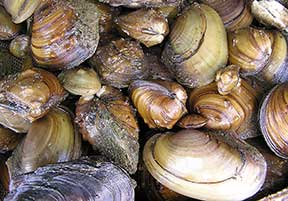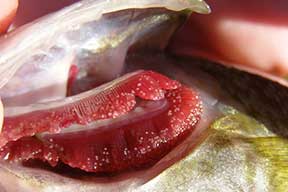Extension website presents ways to help protect Indiana's endangered mussels
June 25, 2015
 |
|
A mosaic of freshwater mussels from the Tippecanoe River. (Indiana Department of Natural Resources/Brant Fisher) |
WEST LAFAYETTE, Ind. - A new Purdue University Extension website explains how the public can help protect the rich diversity of mussel species of Indiana's Tippecanoe River.
With more than 45 species of mussels, the Tippecanoe River is home to one of the most diverse populations of freshwater mussels in the U.S., including six endangered species. Protecting mussels is critical for maintaining good water quality, healthy fish and wildlife populations, and recreational use of the river, said Linda Prokopy, an associate professor of natural resource social science and leader of the mussel education effort.
"Mussels are like the heart of a river," she said. "A single mussel can pump eight gallons of water a day. It's crucial that we protect these organisms that help keep our rivers clean."
Freshwater mussels, also known as clams, use their gills to filter water for microorganisms and nutrients, returning the water to the river in a purer condition. But high concentrations of pollutants, sediment and bacteria threaten many mussel habitats. Mussel die-offs are often indicators of poor water quality in a river.
 |
|
The white, grainy spots on this fish's gills are glochidia, or baby mussels. Hitchhiking on gills helps young mussels spread throughout rivers and is not harmful to fish. (Indiana Department of Natural Resources/Brant Fisher) |
"Heart of the Tippy," an education campaign headed by Purdue's Department of Forestry and Natural Resources and the Indiana Department of Natural Resources, aims to educate the public on the ecological importance of mussels and what people can do to protect them.
The website offers three main ways the public can help preserve mussels and their habitats:
* Don't pick them up: Mussels may look tough, but they are actually delicate organisms and cannot survive out of the water for long, Prokopy said. It is also against the law to collect any part of an endangered mussel, whether it is dead or alive.
* Don't litter: Mussels work hard to keep rivers clean. Littering the waterways makes their job harder and threatens their health.
* Carry your canoe or kayak: Mussels can be crushed under the weight of a canoe or kayak dragged over rocky-bottomed shallow water. Recreational boaters should carry their canoe or kayak over these parts of rivers and launch into deeper water.
Anglers can also help protect mussels by washing off their boats to prevent the spread of invasive species. They should also check the gills of their catch for glochidia, or baby mussels, which look like tiny grains of salt. Fish with glochidia attached to their gills should be released to help mussels spread.
Riverside residents can lend mussels a hand by preventing fertilizer and sediment runoff into the waterways. One way to reduce runoff is by planting native vegetation that helps stabilize the shoreline and prevent erosion.
The website also features an online pledge the public can take to protect mussels by agreeing to properly dispose of trash, avoid handling them and carry canoes and kayaks.
Writer: Natalie van Hoose, 765-496-2050, nvanhoos@purdue.edu
Source: Linda Prokopy, 765-496-2221, lprokopy@purdue.edu
Ag Communications: (765) 494-2722;
Keith Robinson, robins89@purdue.edu
Agriculture News Page

